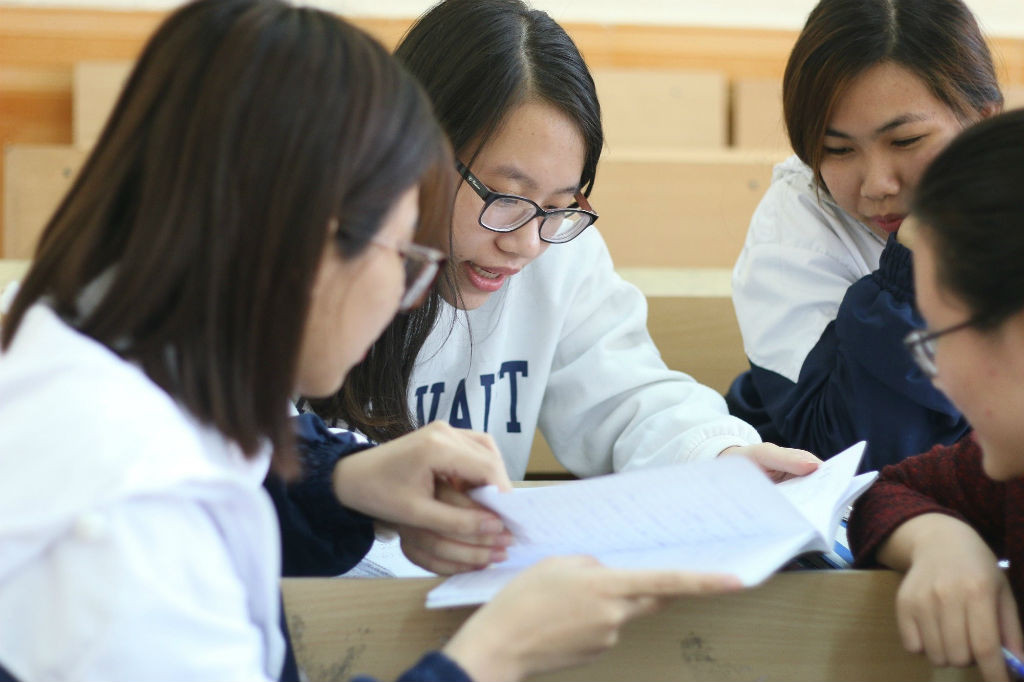Diet for good health and a sharp mind for the national high school exam
To have a smooth 2018 national high school exam, in addition to mastering knowledge of the subjects, candidates also need to have a reasonable diet and rest to bring the best results.
1. Good health
It is necessary to provide enough energy and nutrients every day, combined with regular physical exercise. Eat enough main meals and add a few snacks every day with a variety of foods.
Main meals need enough carbohydrates from rice or sticky rice, bread, corn, potatoes, pho; protein from meat, fish, eggs, milk, soybeans...; essential fats from fatty fish, vegetable oils...; vitamins, minerals and fiber from green vegetables and fruits.
Depending on each person's nutritional needs, you can eat from 1.5 to 3 bowls of rice per meal.
Every day, eat about 150g of meat or 200g of fish, shrimp, eggs, tofu...; 300g of vegetables (about 3 cups of cooked vegetables); 2-3 portions of fruit (one portion is equivalent to 1 banana or 1 orange, 1 cup of ripe papaya...); drink 2 glasses of milk.
Daily physical exercise such as walking, jogging, cycling… combined with deep breathing will help increase physical strength and flexibility.
 |
| The 2018 National High School Exam is very important to candidates. |
2. Sharp mind
A sharp mind will help the brain quickly synthesize, analyze, and link learned knowledge to choose the most correct answer or solution when doing exercises.
- The brain needs omega-3 fats from fish (mackerel, salmon, herring, tuna...). You should eat at least 3 fish meals per week to get omega-3 fats for your body.
Phospholipids in egg yolks help improve memory. You can eat 1-3 eggs per week. Protein from meat, fish, eggs, milk, and soybeans will provide amino acids that create neurotransmitters.
- Use iodized salt (or iodized seasoning) daily in food preparation (do not add too much salt) to get enough iodine for the body. Iron is essential for blood production.
Iron deficiency leads to anemia, which means the brain is not supplied with enough oxygen, leading to poor concentration, difficulty remembering, and forgetfulness. Iron is abundant in liver, meat, fish, eggs, green vegetables, and beans.
Iron from animal sources is better absorbed than from plant sources. Female students from puberty onwards are susceptible to anemia due to monthly physiological blood loss, so it is necessary to supplement iron and folic acid according to the instructions of school health staff.
- Arrange a suitable study time. Don't stay up too late because the end of the day is when the brain needs to rest.
- Regular review is also a very effective way to strengthen memory.
3. Sleep is important
About 6-8 hours of sleep is enough. Sleep needs to be deep and long enough to help increase resistance, clear the mind, and strengthen memory.
When you are too tired, take a nap for a few minutes to help your brain rest and your eyes feel less tired. If you are too sleepy, take a nap even for a few hours. Short naps in between will help recharge your body so you can continue studying better.
Do not abuse tea or coffee to stay up late to study because it will stimulate the nervous system, keeping you awake but not clear enough to remember the lesson.
 |
| Candidates need to arrange time to study and rest reasonably. |
4. Reasonable rest time
You need to rest, relax, and get enough sleep. If you study when you are alert, study the right method, take notes of important ideas of each topic, and review regularly (don't wait until the exam to study), your memory will be consolidated.
Then it will not take much time to study and there will be time for fun, rest and entertainment. A relaxed brain will remember better.
5. Avoid hypoglycemia due to not eating enough
Hypoglycemia is very likely to occur when skipping meals or eating carelessly. This condition often occurs during the last periods of class or at the end of exams.
At that time, you will feel dizzy, tired, weak, sweaty, cold hands and feet. If you do not get energy in time, you may faint.
If you are hungry, your blood sugar levels drop, reducing your ability to concentrate, so you won't be able to study well.
When you have low blood sugar, quickly suck on one or two candies, drink a glass of sugar water, or a carton of fresh milk, eat a few biscuits or a banana… Then eat more rice, bread, noodles… to prevent further low blood sugar.
The best way to prevent hypoglycemia is to not skip meals and to eat a full meal with all food groups.
In case you cannot eat enough, between two main meals you need to add 1-2 snacks such as fresh milk, yogurt, fruits, nuts, potatoes, corn...
6. Avoid food poisoning
Be extremely careful with street food. Choose a clean place, with tap water (not water from a basin), food displayed on high tables covered with glass, choose cooked dishes (rice, noodles, pho…).
Avoid eating undercooked foods: rare pho, raw eggs, raw fish salad, grilled dishes, raw vegetables... Do not drink ice water (it is best to always carry a bottle of boiled water).

